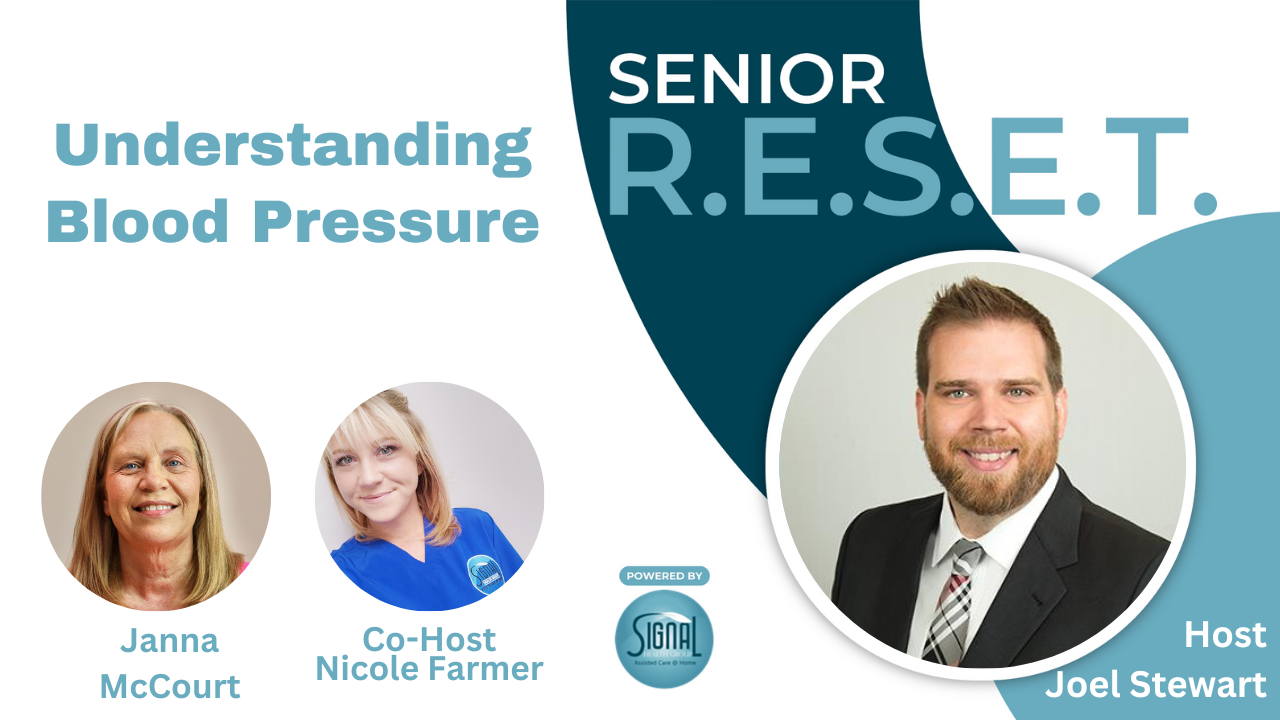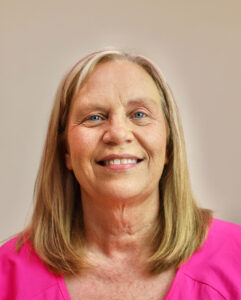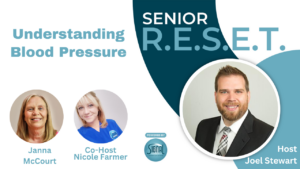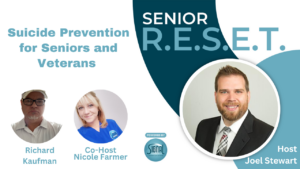Watch Here
In this episode of the Senior Reset podcast, co-hosts Joel and Nicole invite Janna McCourt, a healthcare professional, to discuss blood pressure. Janna emphasizes the importance of monitoring blood pressure for assessing general health, disease progression, and early detection of heart-related issues, such as hypertension.
Blood pressure consists of systolic and diastolic pressure; the normal range is 120/80. High blood pressure, or hypertension, is often called the “silent killer” due to its lack of noticeable symptoms. Low blood pressure, or hypotension, can cause dizziness, fainting, confusion, and other issues. Janna advises avoiding excessive salt intake and processed foods and consuming fiber-rich foods to prevent constipation-related vagal nerve stimulation.
In this episode, we also discuss the role of the vagal nerve in blood pressure regulation and the importance of recognizing warning signs to prevent syncope and accidents. The hosts discuss the standard blood pressure reading of 120/80 and variations among individuals, emphasizing the significance of regular blood pressure monitoring.
Jenna also addresses low blood pressure, its symptoms, and potential dangers, especially for seniors. The podcast also discusses the role of the vagal nerve in causing fainting. It offers tips to prevent low blood pressure, such as staying hydrated, avoiding constipation, and maintaining regular exercise.
Highlights:
{00:42} Introduction to Janna McCourt
{02:22} The Importance of Blood Pressure Monitoring:
{06:33} Understanding Blood Pressure Numbers:
{11:56} High Blood Pressure Risks
{25:34} Managing Blood Pressure
{29:10} Checking Blood Pressure
{34:47} Proactively addressing blood pressure issues
Links:
Website: https://signalhg.com
Listen Here
Joel
Hey, everybody, and welcome to the Senior Reset podcast. We are talking resources, education solutions, entertainment, and training for the senior community and their families. I have it with us today—a couple from our Signal Health Group in Indiana. We have our co-host, Nicole Farmer, and Jana McCourt, the administrator and director of nursing for Signal Health Group. She will be talking with us a little bit today about blood pressure. What is blood pressure? What do those numbers even mean? Why is it important? How are you doing today, Gina?
Gina
Good. How are you?
Joel
You’re doing all right, you know. Could you just kick us off and tell us a little about yourself and your background?
Gina
I’ve only been a nurse for about 13 years, but I was a nurse. Practically all my life, my brother was in a car accident when He was 18 years old, and he had a C6/C7 injury, which made him quadriplegic.
So, after his accident, he came and lived with me when he did rehab, and I cared for him for 18 years. So once he passed away, I had to do something with my life, so I went to nursing school. One of my first jobs was in home health care, and I loved it so much because, you know, I was already a caregiver, so I understood what it was to be a caregiver and what it was to come into somebody’s home. I just had the natural ability to feel very comfortable going into other people’s homes, and I think I was like that because I was a caregiver for all those years.
So, adding my nursing degree to my already lifelong experience, going into home health, I loved it, and I didn’t want to do anything else, but I have done a few other things in my career. But I always come back to “home health.”
Nicole
We suck her right back in.
Joel
All right. So, with blood pressure, can you give us a little background on it, and you know why it is important to keep it? Track of it.
Gina
Monitoring your blood pressure is important because it evaluates your general health. It evaluates the progress of diseases you might have. It assists your physician in diagnosing different things. Mainly, high blood pressure helps you to evaluate how your treatment is going. And it helps in the early diagnosis of heart-related diseases. And other diseases related to high blood pressure, like kidney disease CHF. Hypertension. Many disease processes have hypertension as well. One main symptom is monitoring your blood pressure is very important, especially if you have been told you have hypertension and you’re on medication.
Joel
Hypertension is when one of the chambers of your heart starts getting a little bit bigger because of the high blood pressure.
Gina
No, the numbers for the blood pressure, like the top number, are what we call the systolic blood pressure measures—the pressure of the blood flowing through your arteries when the heart beats. So, as your heart beats, that first number is the pressure against your arteries.
So, the diastolic, the bottom number, is how much blood pressure goes through your heart at rest. So, you have one measuring how it’s flowing as it’s going through, pushing against the arteries, and the bottom number is at rest.
Joel
What do you generally like? To see those numbers.
Gina
Well, the normal is 120/80. That’s the consensus, but blood pressure varies for everyone. I mean, my norm may not be somebody else’s norm. Older people generally have lower blood pressure. I don’t know, maybe because they’re not as active, I don’t know why, but sometimes they can have a higher blood pressure if they have kidney disease, especially if they’re on dialysis.
It may be more elevated than a normal person their age. I once had this patient on dialysis; he always had high blood pressure and was taking much medication. But you know, when you’re on dialysis, it’s three days a week, they’re taking all of your blood and filtering everything out of it.
So, you know your medication only sometimes stays there to be effective; many medications must be in your system for some time. But then, you know, I’ve had many patients whose blood pressure is really low for some reason, and they may be on many medications, but it may be because they have some kind of heart situation, and the doctor wants their blood pressure to be low. Now, you pass out if it gets too low, so we don’t want it too low.
Joel
That’s not a good thing.
If someone’s blood pressure remains elevated, it sounds like it could be a warning sign that something is wrong with the heart and the organs. Something is going wrong, but there are other dangers from having high blood pressure for an extended period.
I imagine you’re saying the number is how much pressure is on your arteries and veins. So, what happens if you have lots of pressure on your internal piping? If you will, for your blood over a long period? It doesn’t sound like it would.
Gina
No, it can damage your heart, and it can damage your arteries. So, high blood pressure, according to the heart, the association is the silent killer because you don’t have any symptoms. Until it’s already done some damage,
So that’s another reason why keeping your doctor’s appointments and recording your blood pressure is important. You don’t have to take it every day but take it weekly. You know, and then taking that blood pressure to your physician at your regular appointment and having him review it because if you just have one high blood pressure, the doctor will not put you on medication.
But if it’s consistently high or very elevated, they’re more likely to Prescribe you some kind of medication to lower that. But you know you don’t. You don’t want high blood pressure because it can damage your heart, kidneys, and brain. Going without treatment can cause Tias, a transient ischemic attack stroke. You can have a stroke or a heart attack. It can enlarge your heart. It can cause peripheral artery disease, aneurysms, and kidney disease.
And it can even break the vessels in your eyes. So having high blood pressure is not good, but You know, you need to go to your doctor frequently or, you know, to go to your doctor like I do. I go to my doctor. All the time, I feel like I live at my doctor’s, but keeping your regular appointments, you know, will give your physician a better idea of your normal blood pressure. And if it’s always elevated, you know, above that 120. Or over 80.
Then, eventually, he’s going to put you on some medication to help lower that. They might also put you on a stat cholesterol medicine because of cholesterol. High cholesterol and high blood pressure are not good, and they’re not good together, so, you know, controlling your cholesterol and what you eat is important, too. When you have high blood pressure
Joel
Yeah, I imagine there are a lot of dietary changes that make a difference with that kind.
Gina
Yeah, no salt, you know; watch what you’re eating. Many older people are on a fixed income, and maybe they’re living alone, or maybe it’s just a spouse who lives with you. Making meals and going to the grocery store become hard, so they’ll often buy those pre-made TV dinners. Back in my day, that’s what it was.
Joel
I used to live off those myself when I was younger. That’s how I got through college, I think.
Gina
A big thing. I always liked the apple dessert, but anyway, I mean, you know, they’ll make shortcuts, and they’ll get those premade meals, or they’ll get canned soup. If you look at the sodium level, those meals are way above what we should eat. They use that to help—preserve the meal—staying away from canned soups, pre-made meals, and even the ones called Good for You. You know, the healthy ones. If you look at the sodium content, it’s like way up there.
Joel
Yeah, I used to look at those too. I think they’re called healthy because there’s half. There is as much food in there.
Gina
Right, right.
Joel
It reduces calories, yeah.
Nicole
Until you eat two of them.
Joel
Yeah, yeah. Yeah. Well, so. What about low blood pressure? So high blood pressure is putting force on, you know, every artery in your body, your brain, and your organs everywhere, and so low blood pressure is the resting rate of just the resting pressure. So, what kind of happens with low blood pressure over time if you’re struggling on that side?
Gina
Well, low blood pressure can cause, you know, blurry vision, confusion, dizziness, fainting, light-headedness, nausea, vomiting, sleepiness, and weakness.
So, the problem with those things is that you have syncope when your blood pressure goes too low or fast. And you can pass out, which isn’t good because if you pass out, you might fall, hit your head, crack your head open—you know, fall, break a bone. Maybe you’re driving your car, or, you know, your blood pressure drops fast. You know, you might have an accident. So, low blood pressure is not good either. I mean low.
We didn’t mention that high blood pressure is anything greater than 130/80. And if your blood pressure gets over 180/120, that is a hypertensive crisis. And if it gets up that high, you need to be in the emergency room because that can cause strokes, aneurysms, and heart attacks—all those things.
Joel
With the strokes, that’s where it’s like; maybe plaque is built up in your arteries and constricting blood flow, which is why your pressure is so high. And then maybe that plaque breaks free and ends up in your brain. That kind of stuff happens.
Gina
An aneurysm is when the pressure on your arteries and veins is so high that it bursts one of them.
Joel
It just pops like a balloon.
Gina
It just pops. You might have a weak spot in your vein or artery, like an abdominal aneurysm. That’s a weakness. So. If your blood pressure gets too high, it can burst, and you can go blind, or all kinds of things can happen. You can, you know, have paralysis from it. You can bleed out internally and not know. But usually, with aneurysms, you have an instant—massive headache.
So, if you have an instant, massive headache that comes on suddenly and doesn’t go away with Tylenol or whatever, it’s so excruciatingly bad that it feels like your head will blow up. You need to go to the emergency room—call 911—because something bad is probably happening, like an aneurysm.
If you have one and it’s caught soon enough, they can stop some bad things. It’s just like having a heart attack. If you get those first symptoms and get treatment right away, your chances of not having any damage to your heart are greater than if you wait a day while you’re having chest pain, and you know you. Try to weather through it until you get to the point where you can’t stand it anymore. You know that. You’re just having so much pain that you can’t function, and by that time, you know you’ve already damaged your heart.
One of the other things I want to mention is Hypotension. When I was in home health, I always taught My patient that I was dealing with an older adult.
And many times, you know, you don’t eat right the older you get. You may be taking medications that cause constipation. And I always told them about that. Vagal nerves, stimulation, many falls, and older adults happen in the bathroom when they’re on the toilet. Because there may be constipation straining to get it out, it activates that vagal nerve, and then, once your vagal nerve is activated, your blood pressure just crashes.
And then that’s when you have that syncope where you just faint. I happened to do what my dad wanted, and he fell, and it looked like he had been through the war or something. He had big black eyes, and the whole side of his face was bruised up because when he fell, he fell and hit the sink.
As you get older, you must try not to avoid constipation and seek medical treatment. You know, there are many stool softeners. You know you can eat prunes; you can drink prune juice. You know, lots of fruits and vegetables. Meat tends to cause constipation. You know, there are bulking agents like MiraLAX.
MiraLAX is one of those medications that is tasteless. You can mix it with any kind of fluid, but what it does is that it’s a bulking agent, so it gets into your stool. And it acts like a sponge, drawing fluid from your body into your stool. That’s what keeps it going. Soft, but it can also, if you don’t drink enough, be the opposite and cause constipation. So, you know, if you’re in mirror life, you’ve got to make sure you’re drinking enough water every day.
Joel
Yeah, that Vagal nerve, I think everybody should be aware of. It could start triggering at any point. From my understanding, I’ve had some experience with it, and it could be from the sight of blood. It could be from a lot of different sources.
Gina
Oh yeah.
Joel
What? Yeah. What happens? Your blood and your blood pressure, from what I understand, the veins in your legs swell up. Your blood starts to pool, your blood pressure just collapses, and even your heart can stop. I had an episode where my heart stopped for some time, and so on, but yeah, it’s where you have to be Cognizant; if you start feeling lightheaded, you get on the ground. It doesn’t matter if you’re in public. It doesn’t matter if you’re on the toilet. You start feeling that light-headedness.
Come on, suddenly that means your blood pressure is dropping through the floor, and you might not realize how close you are. I would just say you’re gone when you black out, as you know from my experience. Yeah, you’re sitting up one day, and then pretty soon you feel like you’re waking up groggy, and you’re on the floor, and you know, and you’ve probably fallen into many things. The way down and not realizing you, just it’s Honestly, it’s really scary.
Gina
I mean, many different things can cause, you know, syncope or that drop in your blood pressure. One is in older adults, when they get up if they get up too fast or go from sitting to standing or lying to sitting. They’ll get that dizziness, that funny feeling. And that’s just because, you know, their Blood pressure is not regulating itself fast enough. When they do those tasks, you know, sitting up or standing,
So, in older adults, we always advise them not to get up from a standing position quickly, you know, do it slowly, and get your bearings before you take off walking. If you’re in bed, when you sit up, sit on the side of the bed and let your legs dangle for a few minutes before you try getting up. And I learned this the hard way. People with spinal cord injuries find it difficult to maintain blood pressure from standing to sitting.
So, doing it too quickly can cause them to have that drop in blood pressure and have them have those. That syncope happened when my brother first came home from the hospital after rehab. He wanted to take a shower. Well, we still needed to get our shower business all figured out.
And my husband and I picked him up, and we took him in and put him in the bathroom on one of those little seeds. And we did it so quickly that his blood pressure dropped. And, you know, I didn’t know what was going on. On it was the first time it ever happened and so on. I’m on the phone Calling 911. You know my mind, I think. I’ve killed my brother. You know.
Joel
Yeah, it can seem that way.
Gina
So then my brother-in-law came in, and all he did was push forward. And his blood pressure came back up. And he, you know, came back to us. But, I mean, in my 18 years, we had many episodes where he would just sit up too fast and pass out. He said that sometimes he would see them. Remember that little commercial? And the Cha Cha Cha. He would say he would see that cat, you know, doing the Cha Cha Cha. But really, it’s not. It’s not a funny thing, but I mean, after so many years, you know, you begin to laugh at some things.
Nicole
That you survived.
Gina
Yeah, yeah. I can’t make this stuff up; it’s just that it is. In life, you know things.
Joel
So, with low blood pressure, I mean, after one of my episodes, the doctor recommended I have more salt. So, it’s like the recommendations when you have low blood pressure—the opposite of high—that more sodium can help.
Gina
Yeah. If your blood pressure is on the lower side, they may prescribe that you eat more and have more salt intake, but Those are rare and far between. I mean, you know, they’re
Joel
High blood pressure is far more common and problematic.
Gina
More, more, more people have high blood pressure than low blood pressure. So, you know, many things can cause high blood pressure, like being overweight, eating too much salt, and not getting enough exercise.
Nicole
Here, I should probably go check my blood pressure.
Gina
As we get older, we don’t like to exercise. I mean, I know I don’t. My exercise is walking up the steps to bed every night.
Joel
I do one set-up a day. I get up in the morning. That’s half the old Mark Lowry joke I thought was hilarious.
Gina
Yeah, yeah.
Joel
Lay down at night. That’s the other half.
Gina
You know, drinking too many alcohol- or caffeine-based drinks (coffee, tea, coke), smoking, or vaping. Those are two of the things that are one of the major things that cause high blood pressure. Stress. You have high stress. Job stress.
Joel
Nobody’s stressed around here nowadays.
Gina
Stress can raise blood pressure. When you go into the doctor’s office often, your blood pressure is slightly elevated because you know you’re in there with the doctor. You know, he’s going to ask you all these questions. You know, you probably need to do what you’re supposed to do.
Nicole
Yeah, Joel put it together.
Gina
So what they fill out is that white coat syndrome, where, you know, they’re kind of afraid to see the doctor, so their blood pressure is elevated. So they’ll wait 20 minutes and then take your blood pressure again. And then, when you know you sat there for 20 minutes, your blood pressure goes back down.
Nicole
But yeah, that’s a good point. My dad has to have a physical. When he was at work, when he drove a truck to pass his physical, if his blood pressure was high, they would tell him to go in and lie down in a dark room. A little bit of relaxation and. Then they would do it again. So that’s kind of, maybe, even a good tip. If people feel high blood pressure, maybe turn the lights out.
Gina
You can try to sit down, but you can’t really. I feel that way. Blood pressure. That’s why it’s called the side.
Nicole
Well, I guess that’s true.
Gina
Killer because you don’t have any symptoms of it.
Joel
I imagine if your blood pressure is high because of weight-related things, and you’ve put on a fair amount of weight, your blood pressure is going up, and that causes problems, and then you get on a bunch of medication that’s meant to help with the high blood pressure, and that causes more problems. I like it for me. I hate being overmedicated. I hate being on any medications at all if I can help. Because they always come with more side effects. I need other medications. I think it’s probably pretty good advice that if you have high blood pressure, you think it’s weight-related.
Try to get the weight and check it because from what I’ve seen with other people and just from my logical intuition, many things can cause high blood pressure. It sounds like it, but if you know that your weight is contributing to that, focusing that down is probably much preferable to getting on a whole host of medications because those can stagger symptoms on the symptom. It causes a whole other host of issues.
Gina
I have autoimmune issues, so I’m on medication. I always said I didn’t want to be one of those people, but I am one of those people who has a page full of medications. But you know, it is what it is. You have to treat things as best you can, and you’ll.
Joel
We did have another guest on here just to talk about autoimmune issues. That’s another thing that’s ramping up. We’ll have to add it to the educational library we’re building here.
Gina
Yeah, it’s not fun. But with autoimmune disorders that can elevate your blood pressure too, just being over the age of 65, you know I’m
Joel
You’re not over the age of 65. Come on.
Gina
I’m going to be 61 this year. I will be 61 this year, so I’m getting to that age, but I already have high blood pressure.
Nicole
My mother just hit 66, and don’t tell her because she gets really upset when you tell her she’s 65—followed this year like, no, we did not last.
Gina
I told my husband last year that we turned 61, and he goes. Honey, we’ve just turned 60 this year. I thought. Oh, man, I’m one more year closer to retirement, but
Nicole
I will hang out here at 29 for a while; just stay.
Gina
Here for a while. Living in a deprived area is also one of those things that can cause high blood pressure. And many diseases can cause high blood pressure, like kidney disease, diabetes, and long-term kidney infections.
Joel
I’m getting there right now.
Gina
Narrowing of your arteries that supply your kidneys Hormone problems includes lupus, an autoimmune Scleroderma, an autoimmune disorder, and Medications like steroids and ibuprofen. Contraceptives and antidepressants can also be used. Contribute to high blood pressure.
Joel
I don’t think many people in America are on antidepressants, so that’s. Yeah, I’m just kidding. It’s a real problem.
So, how can people check their blood pressure regularly? Some people like me go to the doctor’s office every six months or something for a regular checkup and only check it. Then, you know, are there ways people can check it more often than that?
Gina
Well, your best bet is just to buy a home monitor. If you’re low-income or on a state-funded program like Medicaid, your physician can often write a script for a monitor. If you have hypertension, you can get that at the pharmacy. If you’re not on one of those things and can afford it, just buy a unit that is easy for you to operate, and the best way to know that is to talk to the pharmacist and ask them, you know, tell them.
Oh well, I have a little trouble with my hand dexterity. I need something that’s going to be simple and accurate. They can help guide you into what kind of unit you need because they have all kinds of units. I mean, they have ones that go on your wrist. They have ones like that.
You know, you just put on your arm and push a button, and you know you have a little unit over here even nowadays. You can get an app that will measure your blood pressure. You can just put it on your arm, and it will measure your blood pressure, of course. That costs you, like, 12 bucks a month to have. So, you know, I don’t have that because I won’t pay 12 bucks a month for it.
Nicole
Worst-case scenario: Walgreens.
Joel
I don’t even just check it.
Nicole
Worst-case scenario: Walgreens, like if they Can’t afford one? And they have the ability—Walgreens, CVS, Walmart, Meyer—those places have one. So you can sit down. I remember being a kid going over, and you had to sit down and let that blood pressure go.
Joel
Yep, Yep.
Gina
I don’t think they have them anymore.
Nicole
Yeah, they do. Walmart is a scale, too. It tells you how high your BMI is. I don’t love that.
Joel
When I was in the military, we had one at the gym where the guys could check their blood pressure before the workout or just get it.
Gina
And many times, you know, you can, you can just go into your doctor’s office and say Hey, you know, can you take my blood pressure, you know, real quick, and they’ll companies, they’ll do that as a service. Just take your blood pressure because, you know, they don’t only have meaning in asking that question. But. If you come in too often, they’ll write you off. A script for one so.
Joel
To recap what we talked about today, it’s so it sounds like. So when you’ve got blood pressure and your blood pressure is high, like over 130 or 80, is that about the limit? As you start getting over that, you start getting into the realm of high blood pressure. And as that blood pressure goes up, that puts more pressure on every blood vessel in your body. Including in your brain and over time, weak areas can expand out, especially in the brain. It can cause aneurysms. It can expand your heart and cause all kinds of heart problems, and it can generally cause much damage if you have high blood pressure over time because that pressure is just not good for you.
But there’s usually something causing it. Whether it’s weight, some issue with your organs, or something else, there’s usually an underlying cause. And so, you know, you generally want to figure out what that cause is and address it. But short of that, there are dietary changes you can make. There is medication that can help you try to get that blood pressure down and avoid some of the worst-case scenarios. And I think you said you go to the hospital, like 180/120, if it’s over. If it’s up there, that is very problematic.
Gina
The problem with our older generation is that they are on that limited income, and I’m sorry, but Social Security does not pay for our inflation, and I can’t tell you how many times I’ve gone into clients’ homes. And I opened up the refrigerator to see what they were. Eating, and there’s no food in the refrigerator, and they have to decide. Will I buy food this month, or will I get my Medication? This should never happen in the United States.
I mean, we’re a wealthy company. I mean country. And, you know, our older adults. Who has served us all their lives? Our veterans should not be faced with that issue where, you know, they have to decide what I am going to buy this month. Am I going to pay my rent? Will I buy my medicine, or will I buy food this month? At times, their food choices are poor because the cheap things are the things that are bad for you. Like soup, I mean, you can often get soup on sale. Four cans for a dollar, you know? I mean, that’s cheap. Older people only require a few calories. The older you get, the less food you eat.
But the older you get, the more exercise you need because you stop exercising or you slow down, and you know that causes problems, too. When it comes to high blood pressure, do you know what time it is?
Nicole
If any of our listeners have someone struggling with their blood pressure, if they have a loved one whose blood pressure keeps spiking and going up, if they qualify for home health, that could be a medical management issue. It could be a disease education issue.
So that is something else we can help with. Keeping it down, keeping it under control, monitoring it, and teaching them about the ins and outs in a little more depth than what we’ve talked about today if that’s something they would qualify for.
Joel
Awesome. And then, in the low blood pressure front, you know the biggest issues with the low blood pressure are that it can lead to being mentally foggy, becoming not alert, and possibly even passing out syncope, which if you are driving if you’re doing something, or even if you’re just sitting or standing, can cause enormous damage to yourself or others.
And so, if you check your blood pressure regularly and realize it’s pretty low. You occasionally feel a little dizzy; you might be on the edge of something that could be an issue, especially if you’re driving. But even if you’re just sitting, falling out of a chair, you can hit your head hard on something. If you have low blood pressure, you should look into that and try to figure out what’s causing it with your doctor. You can make some dietary and lifestyle changes to help with that.
And don’t just think that you are dodging the bullet because you don’t have high blood pressure. If your blood pressure is too low, it can have its effects. Is there anything else you want to discuss on the blood pressure issue while we have you on the call?
Gina
That just about covers it. It’s my blood pressure.
Nicole
You know. I’m just kidding. My blood pressure is good; it stays around 112 over 60. Five, almost all this. That’s good.
Joel
Way to brag, Nicole.
Gina
Picture I’m not going to tell you mine, OK?
Nicole
You know, it’s not just adults. I know. That’s what we focus on here. On the other hand, my daughter had high blood pressure for years. Every time we went to the doctor, she struggled with her weight, and her blood pressure was always high. She would get nosebleeds, and They had talked about putting her on medicine, and that was the final visit before it. She almost kind of sank in, and she started taking a little more control of herself and exercising more. And it’s under control now, but hers was scary for a while.
Gina
Well, that was one of the points I was going to make. If you can make those dietary changes and lose weight, hypertension will often disappear. Diabetes will go away sometimes. If you lose enough weight and start exercising and eating the right things, you know your diabetes will disappear, and you won’t have to take medication. It’s always a joy when a client gets to that point where you know they don’t have to take their diabetic medication anymore because they’ve done everything they need to do. Please get rid of it. And you know what I’m talking about. If you live long enough, you’ll have diabetes at some point. It’s almost a given that you’ll end up with diabetes. When you get older, especially if you have Family members, you know that genetic disposition for it.
Joel
Well, especially if you eat the typical American diet.
Gina
Oh yeah, McDonald’s.
Joel
The death sentence: All right.
Gina
We’re not a good example of Healthiness in the United States, so you know, you don’t see these things in Asians very much because, you know, they do have a different type of diet, and they do focus a lot on exercise.
Joel
Yeah. Hopefully, educational segments like this will contribute to a growing movement to change how we live our lives, what we eat, and how much we move. But hopefully, we educated some people today on blood pressure and the importance of getting it under control, especially if it’s running high. And try to avoid the silent killer so that you can stay. Stay with us longer. All right. Well, thank you for coming on with us. Jana and Nicole, and I hope everyone has a great week.
Gina
Thank you for having me. Bye.






